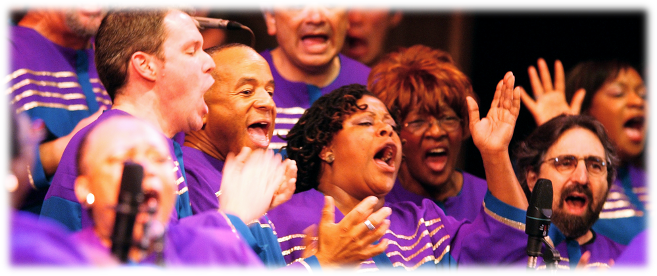Gospel Music Origins

In all her teachings, Sharon seeks to uplift and honor the powerful African-American spiritual musical tradition known as Gospel.
The soulful melodies and rhythmic beat of gospel (literally “good news”) seem to contain the remarkable ability to help people find joy,
comfort, healing, and a sense of God's personal love. Gospel music is the result of a unique combination of powerful techniques based
upon ancestral African wisdom, techniques that invoke the power of song to raise energy, build spiritual community, and communicate with
the spirit world. In the New World this technology has been combined with the “good news” of a deep personal relationship Christian gospel
worshippers have developed with their Lord and Savior.
Gospel songs are typically polyrhythmic, repetitive, interactive, and propulsively driving. As ethnomusicologist Judith Becker (2004) noted,
there is an emphasis on “total participation, total commitment, and loud, strongly emotional delivery.” In gospel choir, the body is used as
the vehicle to experience the divine through the senses. Combined with specific musical amplification, synchronization, and entrainment techniques,
the gospel service is designed to consciously induce a group resonant trance field of one accord (from the Latin; literally “one heart.”)
The ecstatic experience that happens in a black gospel church has many of its spiritual roots in the West African ecstatic practice of “danced religion,”
a tradition which incorporates the elements of trance, spirit possession and the ring shout. Many of the unique ecstasy-inducing tools of black gospel
music also owe their origins to the musical and cultural elements brought to America by slaves; including polyrhythmic percussion, the incorporation of
the body into prayer, and dialogic participatory communal music making. Both gospel church and African religious traditions are ecstatic paths that use
the excitation of the nervous system to create an altered state of consciousness to invite spirit contact. In both traditions, ecstasy is defined in
terms of “ascension” and involves the altering of perception. In both, the goal is to access the power of a greater source, by calling it down.
Gospel uses the conscious praising of God to help a congregation ascend upwards into personal conversation with the divine, and then perhaps higher
still, into a state of absolute ecstasy. These techniques are available and teachable tools, which can be added to the repertoire of many spiritual
communities. Gospel choir offers techniques that can help us to reclaim what Sharon believes is the original fundamental metaphysical ecstatic goal
of the Judeo-Christian prayer service.
For more information about the origins of gospel music, recommended books include Eileen Southern’s scholarly work,
The Music of Black Americans (1971/1997), a fascinating and meticulous narrative of the development of African
American music. British gospel historian Viv Broughton’s Black Gospel: An Illustrated History of the Gospel Sound
(1985) includes profiles of top gospel groups and examines the influence of gospel music on popular music. Also
recommended: music historian Don Cusic’s The Sound of Light: A History of Gospel and Christian Music (1990);
Folklorist Ray Allen’s ethnographic research study, Singing in the Spirit (1991); Gospel musicologist Samuel A.
Floyd, Jr.’s The Power of Black Music: Interpreting its History from Africa to the United States (1995);
Gospel chronicler Anthony Heilbut’s The Gospel Sound: Good News and Bad Times (1997); Horace C. Boyer’s
The Golden Age of Gospel (1995/2000); John Storm Roberts’ Black Music of Two Worlds (1998); Olly Wilson’s
essay The heterogeneous sound ideal in African-American music (1992/1999); Mellonee V. Burnim’s dissertation
The Black Gospel Music Tradition; Robert Darden’s People Get Ready! A New History of Black Gospel Music
(2004/2006); and finally cultural historian David W. Stowe’s How Sweet the Sound: Music in the Spiritual
Lives of Americans, which suggests that cross-fertilization has produced a multi-religious and multi-cultural
brew of American spiritual customs.